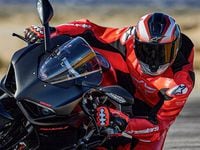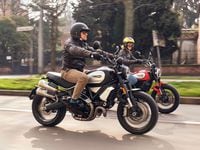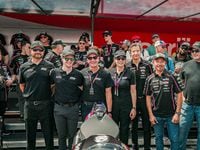First came the rumors then the actual announcement: This year, American Flat Track—previously known as AMA Pro Flat Track—will feature twin-cylinder motorcycles in the premier class at every round of its 18-race schedule.
This decision created more buzz around the sport than anything I have ever witnessed. For as long as I have been alive, riders competing for the national title have ridden twin-cylinder machines at half miles and miles, and singles at short tracks and TTs. I had only seen professionals competing on twins at a TT or a short track in black-and-white photos or on fuzzy YouTube videos.
That isn’t the only change implemented for this season. In fact, I could write a book about all the amendments to the rules and my opinion on them. I have been involved in this sport since the day I was born and I take pride in what I do, so instead of criticizing the changes, I got to work and began preparing for the new challenges that lay ahead.
The first step was turning one of the race-ready Kawasaki 650 twins that I used during the 2016 AMA Pro Flat Track Grand National Championship into a more specialized machine for the first round of the 2017 American Flat Track Series, the Daytona TT, which will take place March 16—inside Daytona International Speedway.
Some readers may be unfamiliar with the term “TT,” which is short for “Tourist Trophy.” While we race mostly on ovals, a small percentage of the events are basically dirt road courses. In addition to the usual left-hand turns, they feature a jump and at least one or possibly two rights. Three TTs are scheduled this year.
Any motorcyclist can look at the geometry of my Big A Customs-framed Kawasaki 650 and see that it wasn’t designed to jump. That being said, these motorcycles are up the task and your name doesn’t have to be Evel Knievel to get the job done. My bike builder, Gordy Schopieray, made some modifications to better suit a TT track.
Adding a front brake was the most important change we made to the motorcycle. I went with an all-Brembo setup. Gordy put in a lot of time making everything fit my custom Durelle Racing front wheel. I also received great insights from Mike O’Neil and Wayne Rodgers from TAW Performance, the Brembo distributor.
Here are the components:
Single Brembo 320mm Super Sport Disc: Heat-treated, precision-ground steel friction area "floats" on a billet aluminum carrier. This allows the friction area to expand as temperature increases, reducing stress on the disc and keeping it flat under even extreme conditions.
Brembo M4 Series Caliper: Monoblock aluminum body minimizes flex even under the large clamping forces generated by four 34mm pistons.
Brembo RCS15 Radial Master Cylinder/Brembo Folding Lever: The decision here was important because of the sensitivity a master cylinder and lever can provide. I wanted a "plush" feel. The coolest part is the adjuster on the lever that will help me compensate for changing track conditions. The folding lever will reduce the likelihood of breakage if I have an "oopsy" and sample the soil inside the speedway.
Ferodo Brake Fluid: High boiling point will keep the system functioning properly throughout the full length of the race.
High pipes were another key component of this build. Typically, we run a right-side-exiting “down pipe” on my Kawasaki twins. I didn’t want to smash my expensive exhaust if I “cased” the Daytona TT jump, so Bill Built fabricated a set of high pipes. The headers loop around the engine and the mufflers fit under my Goon Glass tailsection. We added heat shields so the hot exhaust doesn’t burn through my new Vanson leathers.
Footpegs on a typical flat-track motorcycle are offset. We turn left a lot, so the left peg sits higher than the right one so it doesn’t drag on the ground when you flick the motorcycle into a corner. I didn’t like this setup for a TT, so Gordy built a bracket that raised the right peg. Now, it is the same height as the left one.
Final change was a motocross-style handlebar. On ovals, I run a flat-track-oriented handlebar that sweeps back toward the seat. I grew up with this type of bar and it is perfect when you are racing in a circle. A TT, however, requires a different riding style, so I went with a ProTaper CR High bar.
Because I am still not tall enough to ride all of the roller coasters at Six Flags, I fitted the triple clamp with bar-back risers so I can actually reach the bar and twist the throttle. I also opted for a thicker pad on my Saddlemen seat. Now, I can sit farther up on the motorcycle and get on top of the bar.
I am not sure what to expect later this month at round one of the American Flat Track Series at Daytona International Speedway. That’s okay, because none of the other riders know much about the new course, either. This season will be all about adapting to new challenges and earning points at every round. It’s been a long, busy off-season, so I am ready to go racing.











/cloudfront-us-east-1.images.arcpublishing.com/octane/LOYWWAYTRBBR5OA3NPU6XP7J4Q.jpg)
/cloudfront-us-east-1.images.arcpublishing.com/octane/NBWRTAMSW5HANCPNONLD5PKBJY.jpg)
/cloudfront-us-east-1.images.arcpublishing.com/octane/DT4WL7VWABCDBCSIFPDDCWFDCE.jpg)
/cloudfront-us-east-1.images.arcpublishing.com/octane/PV3YYKRJQBACJHBPHMRPCJOQQ4.jpg)
/cloudfront-us-east-1.images.arcpublishing.com/octane/K4F5IC5N3JGSTEGHCBJCD7L6BA.jpg)
/cloudfront-us-east-1.images.arcpublishing.com/octane/VTWDHKVBD5AHRBRWCUYE6CMFTI.jpg)
/cloudfront-us-east-1.images.arcpublishing.com/octane/KO44HTGR3RCEZFLK5UWMZ5MMUQ.jpg)





/cloudfront-us-east-1.images.arcpublishing.com/octane/3LASNXSWUZFFPISURDJF3OCWBU.jpg)
/cloudfront-us-east-1.images.arcpublishing.com/octane/2BHJKWUTBNBTLMQCKDNVEG6DKQ.jpg)
/cloudfront-us-east-1.images.arcpublishing.com/octane/MPHXIIV54NAU5L6E4SYZHCXVRM.jpg)



/cloudfront-us-east-1.images.arcpublishing.com/octane/WYXFHF4ZOBBTXELIZDB2FJXU64.jpg)
/cloudfront-us-east-1.images.arcpublishing.com/octane/K5FNV7ONUVDXJJ2H5BIWUGBGTI.jpg)
/cloudfront-us-east-1.images.arcpublishing.com/octane/MGVKP5VTNJHQ7FWNAHIWX4OHO4.jpg)
/cloudfront-us-east-1.images.arcpublishing.com/octane/6JEYTSIZQRHPJAVVPRLWZU63UM.jpg)
/cloudfront-us-east-1.images.arcpublishing.com/octane/XJU3VJZSDFEOVDBJTRXTTLTN5U.jpg)

/cloudfront-us-east-1.images.arcpublishing.com/octane/A6O3TEZF45BVFG2KKOUMPWEYM4.jpg)
/cloudfront-us-east-1.images.arcpublishing.com/octane/MHVFMH2YN5DT3EOZPLXKNFP3VM.jpg)
/cloudfront-us-east-1.images.arcpublishing.com/octane/VILA5L7CTBGOJGDKM2YAOCR6VU.jpg)
/cloudfront-us-east-1.images.arcpublishing.com/octane/GZMZRTYRS5A75G2EJDDGXLJEEE.jpg)
/cloudfront-us-east-1.images.arcpublishing.com/octane/6KWAL3TFNJBGTJMJSKQ2C6I3IY.jpg)
/cloudfront-us-east-1.images.arcpublishing.com/octane/GK5I5R3X7JCABGCKAKT4XY2K7U.jpg)
